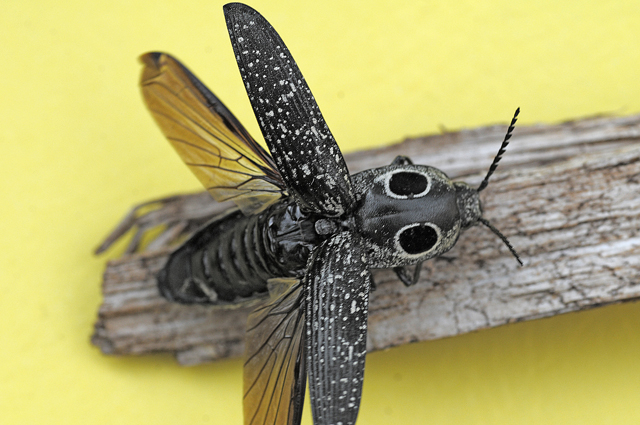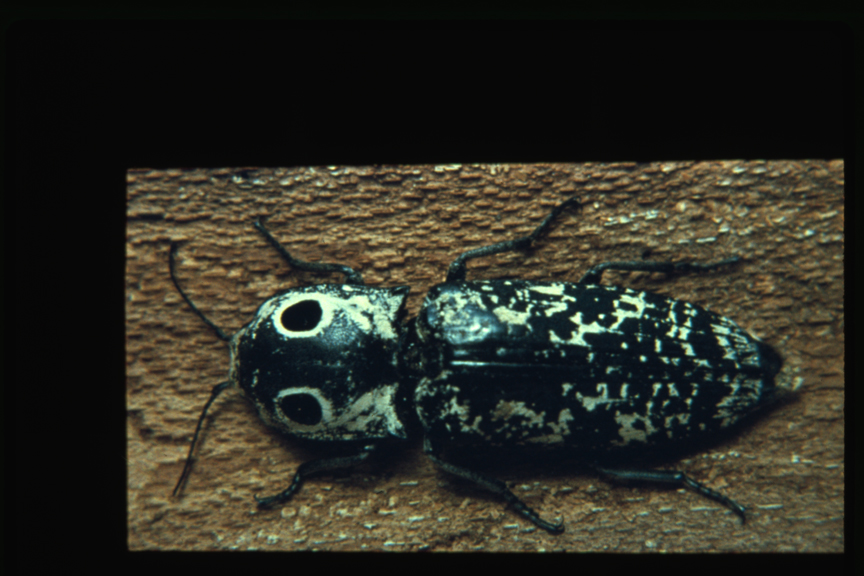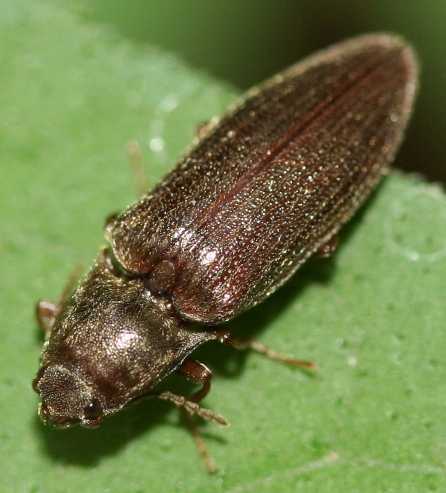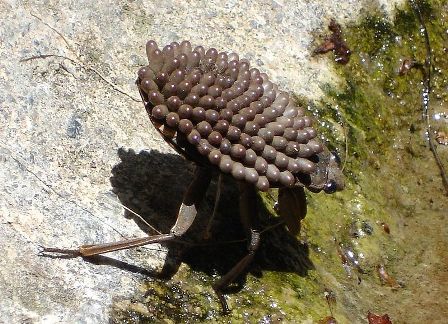
Elater

Elater

Elater
PET BEETLES.
WE were sitting on our piazza one warm evening, when our neighbor over the way opened his front door and proceeded to cross the street.
Now we had never felt much interest in this particular neighbor, a grave, silent man; but this evening every eye was fixed upon him with attention, for as nearly as we could discover in the surrounding darkness, he appeared to be bringing to us a basin of fire, real fire, that lighted up his whole face so that we could see quite plainly how anxiously he watched his fiery dish.
As he came nearer, we all rose, eager to see what this dish contained that burned with such a strange greenish light, and, as we could now see, appeared to be water, blazing water.
As our neighbor paused to open the gate, he stumbled, and the next instant all was confusion.
We saw two gleaming lights rise from the dish, heard a crash of broken crockery, and then were astonished at the sight of our grave neighbor bobbing about up and down the high steps, making quick snatches at the two lights that danced about his hands.
Presently both lights disappeared, while our neighbor entered our family circle so suddenly that several chairs and small children were overturned.
"Beg your pardon," gasped the, gentleman, when he had, at last, found a safe resting-place.
"I was sure I'd lost them. Look here, you young folks, did you ever see fire-bugs like these?"
We, children and all, crowded about him in the darkness, and by the faint light that came through the parlor-blinds, could see him slowly open his hands, and then we saw nothing but two ugly brown beetless, apparently quite dead.
"Well, I declare," said our neighbor in consternation, as the two beetles refused to respond to the friendly shaking he gave them, "I'm afraid I squeezed 'em too hard."
At some one's suggestion the injured beetles were taken into the house and water sprinkled on them to "bring them to," but the shower bath only had the desired effect upon one leg of each beetle.
The revived legs kicked vigorously, but the rest of the beetles refused to come to life until they were dipped in a bath prepared in the canary's bathtub, borrowed for the occasion.
This bath proved the beetles to be impostors, for no sooner had they touched the water than their legs flew out in every direction, and from two large yellow spots on their shoulders streamed the strange, beautiful blaze that had lighted up the water in our neighbor's bowl, now lying broken on the steps.
Those who have never seen the "Elater," as this tropical phosphorescent beetle is called, can have no idea of the strange brilliancy of the light that shines steadily from the spots on its shoulders.
As the beetle lifts its wings, you see the soft body also flaming with light, and you soon think of these spots as windows through which the light from the body shines.
Our neighbor told us of a poor prisoner, who was shut up in a dungeon so dark that he could not see his hands before his face, to whom friends succeeded in sending a little scrap of paper in which was folded one of these elater beetles.
When the frantic, half-mad prisoner unfolded the paper, a wonderful light shone out about him, and in spite of the terrible darkness into which be had been cast by cruel men, he was able to read, by the friendly, steady gleam of the elater, directions, written on the scrap of paper, for escaping by a secret passage leading from his dungeon.
This beautiful light proved true to him, for after a patient search it showed him the stone described in the paper, that could be rolled aside from the hidden door.
We were all glad when we knew that the two fire beetles were ours, and the children immediately named them Jupiter and Mars.
A pretty little red Chinese lantern with perforated paper over the top made an elegant house for our new pets, and when we had put for their refreshment a piece of banana in the tin candle-socket, and hung the lantern to the gas-fixture, we thought Jupiter and Mars might be quite comfortable. When we put the gas out, they rewarded us by brightly illuminating their red castle.
From the first they were very tame, or very stupid, and seemed to have no fear. The children made a tiny chariot of thin white paper and covered it with diamond powder. This chariot was harnessed by silken threads to Jupiter and Mars, and a lovely paper fairy with diamond-glistening hair was drawn by these fiery steeds round and round a marble table. In a dark room, with the weird greenish light from the beetles falling upon the gleaming chariot, this made a very pretty sight.
The entertainment was sometimes varied by placing Jupiter and Mars upon their backs. In this position they were helpless as turtles, until they gave a spring in the air and came down right side up again.
This performance delighted the children, but one evening Jupiter and Mars became tired of the sport, and with one accord rose in the air, dragging the chariot after them, and throwing out the fairy driver, who was badly injured in the efforts of the children to capture the runaway steeds.
Poor Jupiter came to an untimely end at length, through being fed, by the little ones, on wet sugar stirred with a match. The phosphorous paste, thus innocently made, wholly disagreed with the poor beetle's digestion, and we felt so badly over our dead elater that we did not grieve when Mars, taking advantage of the general confusion, escaped through an open window.
"He was safe from matches, anyway," the children said.
Youth's Companion.

Elater

NATURE'S UNDERTAKERS.
How often do we hear the query, "What becomes of all the dead birds?"! The secret of their mysterious disappearance was but just now half told by the buzz of those brown wings, and the other half is welcome to any one who will take the trouble to follow their lead. This beetle is one of man's incalculable benefactors. It is his mission to keep fresh and pure the air we breathe. He is the sexton that takes beneath the mold not only the fallen sparrow, but the mice, the squirrels, and even much larger creatures, that die in our woods and fields.
Beneath that clump of yarrow I found just what I had expected,—a small dead bird, and the grave-diggers were in the midst of their work.
Already the rampart of fresh earth was raised around the body, and the cavity was growing deeper with every moment as the busy diggers excavated the turf beneath.
These Nature-burials are by no means rare, and where the listless eye fails to discover them, the nostrils will often indicate the way; and to any one desirous of witnessing the operation without the trouble of search, it is only necessary to place in some convenient spot of loose earth the carcass of some small animal. The most casual observer could not fail soon to be attracted by the orange-spotted beetles.
I am always glad of the opportunity to watch the progress of these meadow-burials; and had you accompanied me on that morning walk, you would have looked with interest at these little undertakers—seen that feathery body toss and heave with strange mockery of life as the busy sextons worked beneath it, digging with their spiked thighs, shoveling out the loose earth with their broad heads and pulling down the body into the deepened cavity.
—Harper's Magazine.

Bug